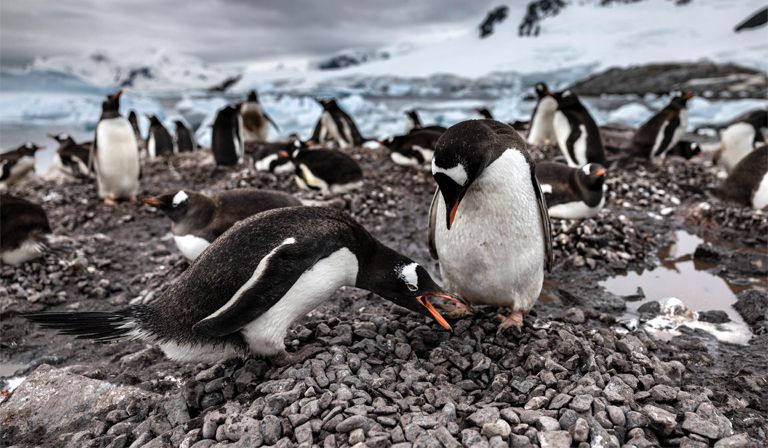Speakers:
Peter Hoskin—Books & culture editor, Prospect—Chair
Anjali Goswami—Chief scientific adviser, Department for Environment, Food & Rural Affairs
Rosie Boycott—Vice chair & director, Peers for the Planet
Dan Crockett—Executive director, Blue Marine Foundation
Emil Dediu—Officer, Pew Bertarelli Ocean Legacy
Eugene Murphy—former SC-CAMLR chair, British Antarctic Survey
James Honeyborne—Documentary filmmaker, Freebourne Media
Mark Belchier—Director of fisheries and environment, Government of South Georgia & the South Sandwich Islands
Pål Skogrand—Chief policy officer, Aker QRILL Company
Ritu Singh—Global science communication, Marine Stewardship Council
Will McCallum—Executive director, Greenpeace UK
Ximena Fuentes Torrijo—Ambassador of Chile to the United Kingdom
Evan Bloom—MPA policy adviser (former US CCAMLR commissioner), Antarctic & Southern Ocean Coalition
The Commission for the Conservation of Antarctic Marine Living Resources (CCAMLR) is, as its name suggests, a body devoted to the protection of the Southern Ocean around Antarctica and the organisms it contains. It was founded in the 1980s, in part due to the increased fishing of krill in the region, and now has 27 members, including China, the US and the EU.
This year, the UK has taken on the two-year chairmanship of CCAMLR. This is a critical time for the commission. Earlier this year, its krill-fishing limits were reached three months early, leading to a suspension of fishing and calls for an extension from countries including China and Norway. These shrimp-like crustaceans are sold as animal feed, among other uses, but are also crucial for the Antarctic ecosystem and perhaps even the global climate. A recent study found that Southern Ocean krill store up to 20m tonnes of carbon a year, the equivalent of taking 5m cars off the road.
Alongside this, CCAMLR is also responsible for administering special regions of the Southern Ocean known as Marine Protected Areas (MPAs), where certain human activities, including fishing, are restricted. So far, there are two of these CCAMLR MPAs—the South Orkneys MPA and the Ross Sea MPA—covering 6 per cent of the Southern Ocean. However, no new MPAs have been agreed since 2016, despite a network of four having been put forward by some of CCAMLR’s member states. The policy is currently in diplomatic deadlock.
In view of these challenges, Prospect recently hosted a roundtable event with the Antarctic and Southern Ocean Coalition (ASOC), an association of 20 NGOs devoted to conserving Antarctica and its waters. Attendees included former and current CCAMLR participants, climate scientists, diplomats and representatives of the krill-fishing industry. It was held under the Chatham House Rule, but we can report the major points of discussion.
The first theme of the conversation was the deadlock itself: why have no new MPAs been implemented for nine years? Here, China and Russia were cited frequently—with the former eager to expand its krill-fishing operations and the latter potentially having a more “disruptive” agenda. CCAMLR acts only on the basis of consensus, so there can be no new MPAs without the agreement of all countries, including these two. One attendee described the pair as experiencing “buyer’s remorse” after signing up to the Ross Sea MPA in 2016, such that they are now “kind of negative” during negotiations.
It was also emphasised that other national interests—or at least the perception of other national interests—have contributed to the current situation. MPAs are proposed and sponsored by CCAMLR member states, which raises questions of whether they are doing so for the good of the Southern Ocean or to forward their own interests. “Having countries suggesting MPAs in their territories is obviously what is triggering a lot of the disagreements,” observed one attendee, referring to a series of territorial claims in Antarctica which aren’t generally accepted. “It would have been much better at the outset to have a CCAMLR-led process by which [MPA proposals] were submitted on behalf of the scientific committee or working groups,” added another.
It was pointed out, however, that there may be nothing especially sinister about the crossover between a small number of countries’ territorial claims and their MPA proposals: “If you overlap a third layer, where the scientific bases of this nations are, then it’s logical—those areas are proposed as MPAs because there's more data on them.”
The second part of the discussion dealt directly with the question of what the UK can achieve with its chairmanship of CCAMLR—or what it can’t achieve. One attendee warned that we shouldn’t “overegg how much traction the UK might have in the next couple of years”. Since the last MPA was agreed in 2016, “probably four different members have been in the chair, and literally nothing substantive in the field of MPAs has been agreed”.
That said, many thought that the UK may have some political leverage during coming negotiations, due to this year’s krill-fishing situation. “If China and others want to move forward on krill,” said one, “it’s going to require some other things that others want to move forward as well. There seems to be an opportunity to come up with a deal that perhaps includes an increase in the krill quota but also allows for one or more MPAs.”
Otherwise, there was a broad consensus that the UK could usefully focus on data—both the collection of it by and sharing of it between CCAMLR member states. There is significant data supporting the need for MPAs; krill may be another matter. “We don’t have the data,” observed an attendee, “to actually monitor and understand the impacts of the rapid increase [in krill fishing] that we’ve already seen this year.” And this is not a short-term problem but, rather, a result of long-term neglect: “There’s been relatively little investment in new data collection—real data for underpinning CCAMLR decision-making—for a very long time.”
Fixing this issue will require diplomacy and care, not just money. “The issues are huge,” said one attendee when explaining the mindset of many member states. “I have intellectual property. If I give it to you, who will process it? How will it be shared? How will it be used?”
And the situation is made ever more complicated by the fact that China appears to have shifted its requirements around data, perhaps as an “excuse” for not acting on MPAs—with a new emphasis on “sufficient”, rather than “best-available”, data. As one attendee wondered, “But what is sufficient data? This way, you can delay a decision indefinitely.”
Even so, good data collection and sharing seems like a prerequisite for progress in the Southern Ocean. “When you have solid evidence, it gets far tricker for people to disagree,” said one. “When there are holes in the evidence, everybody will use them to delay any action.”
The final part of the discussion centred on the role that science, diplomacy and public engagement can play in overcoming the obstacles to marine protection in the Antarctic. The immediate challenge, an attendee suggested, is to increase the sense of importance around CCAMLR and its negotiations. “There is not enough blood in the water,” he said. “It’s not a big drama that warrants lots of political attention or public uproar.”
One way of overcoming this—at least where national governments are concerned—might be to emphasise how CCAMLR fits in with broader goals and commitments. “It’s very much connected with ocean policy as a whole,” said one attendee. “There is the objective to protect 30 per cent of the ocean by 2030, agreed under the Convention on Biological Diversity”—and MPAs could do a lot to help satisfy that goal.
Another might be to highlight the geopolitical import of CCAMLR during difficult times. Both Russia and Ukraine are members of the commission—and, through CCAMLR, have sat in the same room since the former’s invasion of the latter. China, of course, also has a significant presence. As one attendee put it, “These are not small things.”
But perhaps making the most of these opportunities requires CCAMLR members to see China and Russia “not just as bad guys”. “I’ve seen it from my colleagues,” said an attendee, “if China or Russia put something on the table, it’s automatically treated with suspicion.” Another added: “I do think we need to approach them with more trust.”
Can all this be achieved during the UK’s chairmanship? Maybe, maybe not—but there is reason to hope. In one of the final remarks of the roundtable discussion, an attendee praised “the amazing British diplomatic service that can do what nobody else on the planet can do”. Next up on their to-do list: new MPAs in the Southern Ocean.












